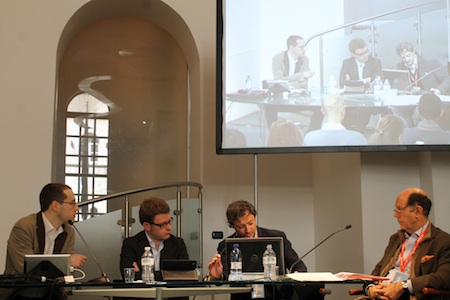Twitter and Journalism: Collaboration, Not Competition
Will Twitter kill print media?
In “Twitter and Personalised Journalism: the Italian Scenario”, presented at the International Journalism Festival in Perugia, the speakers addressed this question immediately. Mauro Turcatti (@ironmauro), the head of corporate and institutional communication at Edelman Italy and moderator of the panel, opened the session by inviting participants to respond by voting their opinion… on Twitter.
In fact, this was not a session discussing the fight between social media and print journalism, but rather, the way that many journalists have married the social aspect of Twitter with their professions. That is, that personal Twitter accounts can help journalists be better in their fields.
Turcatti, along with Andrea Iannuzzi (@aiannuzzi), editor of AGL (Agenzia Giornali Locali); Fabrizio Goria (@FGoria), business and finance correspondent for Linkiesta; and Dennis Redmont (@DennisRedmont), Perugia University Professor and former AP Mediterranean Bureau Chief, took part in the panel, analyzing the presence of Italian journalists on Twitter.
«Twitter integrates the other mediums, it doesn’t substitute them,» Goria said. «It’s complementary; It’s an evolution.»
Whether or not you support or reject Twitter in journalism, its use among journalists is steadily growing. In Italy there are 9,677 Twitter accounts that in some way include the word “journalist” in their description.
The benefits of Twitter for journalists include finding sources, fact-checking, spreading information and even breaking news. The Arab Spring, the case of Giovanna Chirri with the “tweet that was heard around the world” of Pope Benedict’s resignation, and the crowd-sourcing of those affected by the sinking of Costa Concordia, are all examples of journalism and Twitter intertwining.
The panelists agreed. Now it’s necessary for journalists to have a Twitter account. «It’s a part of the profession,» Iannuzzi said.
However, errors in personal-branding on Twitter are easy to commit. The panel presented these “capital vices”, including the classics: greed, lust, envy and even gluttony. Regarding Twitter these vices translate into being rude online, desperately searching for followers, tweeting too much or not tweeting enough, among others.
Like in journalism, you should try to be helpful, useful and timely on Twitter, but also entertaining and fun, suggested Redmont.
As for the language, Eighty-six percent of the 2,000 Italian “Twitter champion” accounts analyzed were in Italian, with English as a close second – though it’s not something the panelists think about much.
Goria switched from Italian to English out of necessity when working on a story about the earthquakes in Japan. Redmont added that it’s also easy to tweet in a mix of the two languages, since many Italian expressions are known abroad.
In any language, it’s important to remember that you are still accountable as a journalist even on social media platforms.
«No one remembers who tweets first. Credibility is more important,» Iannuzzi said.
By Gina Mussio

